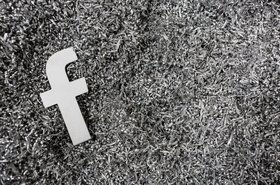After drilling equipment broke during a submarine cable project, Facebook left the equipment - and thousands of gallons of fluid - under the Oregon seafloor.
Officials claim Facebook took over a month to come clean about the incident, a narrative the company disputes. There are currently no plans to retrieve the equipment, but Facebook hopes to restart the cable project next year. It wholly owns the Oregon connection point, but the wider Jupiter project includes Amazon, NTT, PCCW Global, PLDT, and SoftBank.
The social media company said that the equipment does not pose a risk to the environment.
Data is the new oil spill
Facebook's submarine cable contractor Edge Cable Holdings informed the Oregon Department of State Lands (DSL) on April 28 that a drill pipe had snapped near its planned landing point in Tierra Del Mar.
But while the company notified the DSL about the incident, as legally required, it did not mention that 1,100 feet of drill pipe, a drill tip, two tools for drill steering and tracking, and approximately 6,500 gallons of drilling fluid were left behind. Facebook claims it revealed this soon after in a phone call, but DSL claims it was only notified during a meeting on June 17. This delay, it said, prevented any chance of recovering the equipment.
“The accident represents negligence on behalf of the operator, as the equipment was pushed beyond its limits, putting lives and Oregon’s natural resources at risk,” Oregon Coast Alliance (ORCA) Executive Director Cameron La Follette and Charlie Plybon from the Surfrider Foundation wrote in a letter to the Oregon Parks and Recreation Department (OPRD).
“Failure to notify the agency, and abandonment of equipment now apparently unrecoverable on and below the ocean floor, is not only a violation of Edge Cable’s permit, but represents a continuing and permanent trespass of public lands.”
The news was first reported by the Tillamook Headlight Herald.
On August 13, the Department of State Lands notified Facebook and Edge Cable Holdings that it was in default of its permits because it was using the area to “store” the abandoned equipment, violating its permit. The agency said the company has 30 days to reach an agreement with the state on damages to be paid for violating the permit and amend the agreement to address any “current and future risks and liabilities that may arise from the abandoned” equipment, The Oregonian reports.
An initial assessment by DSL determined that there is no immediate risk to the environment, or health or safety concerns, a matter Facebook was keen to highlight.
The company was not immediately available for comment on the exact nature of the drilling fluid, which can include diesel oil, mineral oil, or highly refined fluid compounds. Drilling fluid compounds are highly regulated due to previous environmental disasters, but are still not recommended for release into natural ecosystems. DSL called the components "biodegradable and environmentally neutral."
“Facebook has been an unfriendly neighbor," State Rep. David Gomberg told The Oregonian. "These folks now have to be worried about what washes up on their beach for generations.”
The company is now seeking a permit to resume work on the landing station for the 8,500-mile cable to Japan next year. It plans to use a different drill hole.



